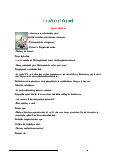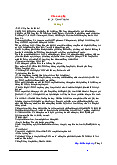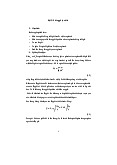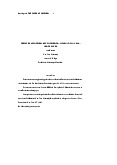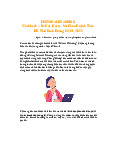





Preview text:
Topic 3: education Học đại học 1. Học đh >< nghề 2.
Học đh >< take a gap year 3.
Chính sách miễn hp đại học 4.
Học đh >< năng khiếu ĐẠI HỌC:
Pursue/ enroll in/ embark on/ register for Tertiary
education= higher education= academic courses
HỌC NGHỀ: spa, nail making, hair salon, car maintenance, baker, bartender
Attend= Job training courses= vocational training courses Academic courses Job training courses Individuals Individuals Are well-equipped with 1. Are provided with specialized knowledge practical skills and Allow them to do work experience complex jobs/ highly- Unskilled jobs skilled jobs which Are able to make a require a deep living without understanding about spending endless the nature of subjects years of training Have a decent job 2. The schooling fees are with lucrative income exorbitantly expensive Social elites (top-ranked educational institutions) Release their families’ financial burden Society Society It is more likely to have a well-educated workforce/ The balance of the labor labor force market Thrive/ boost the Japan, Canda national economy (the severe shortage of (higher work unskilled workers in performance) agriculture, manufacturing sector or medical field) employ people from other countries Đề 3:
It is the basic right for everyone to get access to higher education
Make it free= provide a free-off-charge policy= abolish tuition fees
Regardless of = irrespective of N No matter what S+V
Their financial background= their socio-economic background
Mở bài: A school of thought holds that it is the basic
right for everyone to get access to higher education and
governments should provide a free-off-charge policy for
all students irrespective of their financial backgroud.
While this thinking is valid in some degress, I believe
that it would exert some negative influences on both
students and society in the long run. Nghèo
Financially disadvantaged people
Impoverished/ underprivilege individuals
Live below the poverty line TOPIC SENTENCE ON THE INDIVIDUAL LEVEL WITH RESPECT TO SOCIETY Thân bài 1:
On the one hand, there are some reasons to explain
why a segment of the population advocate the idea that
governments should make higher education free for all
students no matter what financial background they
have. On the individual level, students, especially
financially disadvantaged ones are equipped with
specialized knowledge with an aim of allowing them to
do complex jobs or higher skilled jobs which require a
deep understanding about the nature of subjects
without being family financial burden. As a result, they
are more likely to have a decent job with lucrative
incomes which leads them to lifting them out of poverty
and becoming social elites. With respect to society, it is
more likely to have a well – educated workforce, which
can contribute to the development in national economy
due to their higher work performance. Đề 1:
In contemporary society, many contracting opinions are
divided on whether students should pursue academic
courses that create opportunities for their future occupations
or they should attend job training courses. In this essay, I am
going to discuss the reasoning of both views before outlining
that I am inclined to the former as tertiary education not only
benefits individuals to some extent but also providing society with a high-educated workforce Body 1: nghề
High school leavers/ seniors/ graduates
On the one hand, there are some reasons to explain why a
segment of the population advocate the idea that some
people believe that they high school leavers should be
encouraged to attend vocational training courses. On the
individual level, students are who are provided with practical
skills are work experience.Hence, They are able to make a
living without spending endless years of training.
Additionally, they are not under the pressure of the schooling
fees with exorbitantly expensive prices, especially in top-
ranked educational institutions. This leads to releasing their
families’financial burden. With respect to society, having an
equal number of manual laborers and skilled workers can
create the balance of the labor market. The cases of Japan,
Canada can perfectly exemplify this situation. In fact, the
severe shortage of unskilled workers in agriculture forces
these countries to employ people from other countries. People’s lives / human life Families’ heirloom Đề 4: HOMEWORK
Some people believe that students should be given their
homework. Other people think that it has no effect on
students’ academic performance. Discuss both views and give your opinion? Đề 5:
THE ROLE OF PARENTS AND SCHOOLS
Some people believe that parents play an important role in
their children’s development. Others think that schools are
more important. Discuss both views and give your opinion? Parents:
1. At the early age of development, parents act as a role
model (negative image) for their children to follow
The inherently imitative nature of children
As a result, inappropriate behaviors (smoking, drinking,
cursing) => a precursor for juvenile delinquency VD: domestic violence School: 1. Knowledge 2. Social activities
3. Disciplines (spoil their children excessively)
